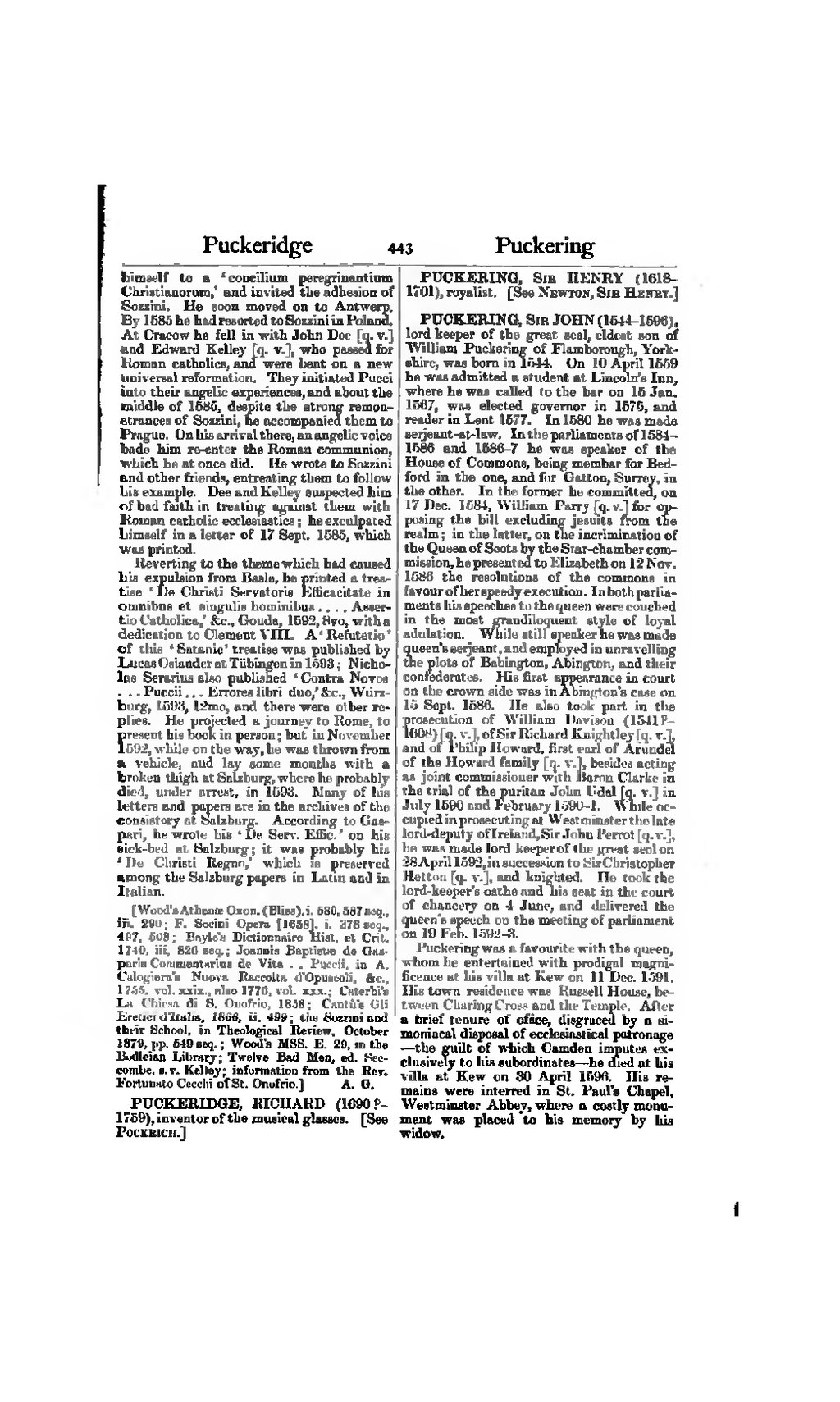himself to a ‘concilium peregrinantium Christianorum,’ and invited the adhesion of Sozzini. He soon moved on to Antwerp. By 1585 he had resorted to Sozzini in Poland. At Cracow he fell in with John Dee [q. v.] and Edward Kelley [q. v.], who passed for Roman catholics, and were bent on a new universal reformation. They initiated Pucci into their angelic experiences, and about the middle of 1585, despite the strong remonstrances of Sozzini, he accompanied them to Prague. On his arrival there, an angelic voice bade him re-enter the Roman communion, which he at once did. He wrote to Sozzini and other friends, entreating them to follow his example. Dee and Kelley suspected him of bad faith in treating against them with Roman catholic ecclesiastics; he exculpated himself in a letter of 17 Sept. 1585, which was printed.
Reverting to the theme which had caused his expulsion from Basle, he printed a treatise ‘De Christi Servatoris Efficacitate in omnibus et singulis hominibus .... Assertio Catholica,’ &c., Gouda, 1592, 8vo, with a dedication to Clement VIII. A ‘Refutatio’ of this ‘Satanic’ treatise was published by Lucas Osiander at Tübingen in 1593; Nicholas Serarius also published ‘Contra Novos … Puccii … Errores libri duo,’ &c., Würzburg, 1593, 12mo, and there were other replies. He projected a journey to Rome, to present his book in person; but in November 1592, while on the way, he was thrown from a vehicle, and lay some months with a broken thigh at Salzburg, where he probably died, under arrest, in 1593. Many of his letters and papers are in the archives of the consistory at Salzburg. According to Gaspari, he wrote his ‘De Serv. Effic.’ on his sick-bed at Salzburg; it was probably his ‘De Christi Regno,’ which is preserved among the Salzburg papers in Latin and in Italian.
[Wood's Athenæ Oxon. (Bliss), i. 580, 587 seq., iii. 290; F. Socini Opera [1668], i. 378 seq., 497, 508; Bayle's Dictionnaire Hist. et Crit. 1740, iii. 826 seq.; Joannis Baptistæ de Gasparis Commentarius de Vita .. Puccii, in A. Calogiera's Nuova Raccolta d'Opuscoli, &c., 1755, vol. xxix., also 1776, vol. xxx.; Caterbi's La Chiesa di S. Onofrio, 1858; Cantù's Gli Eretici d'Italia, 1866, ii. 499; the Sozzini and their School, in Theological Review, October 1879, pp. 549 seq.; Wood's MSS. E. 29, in the Bodleian Library; Twelve Bad Men, ed. Seccombe, s.v. Kelley; information from the Rev. Fortunato Cecchi of St. Onofrio.]
PUCKERIDGE, RICHARD (1690?–1759), inventor of the musical glasses. [See Pockrich.]
PUCKERING, Sir HENRY (1618– 1701), royalist. [See Newton, Sir Henry.]
PUCKERING, Sir JOHN (1544–1596), lord keeper of the great seal, eldest son of William Puckering of Flamborough, Yorkshire, was born in 1544. On 10 April 1559 he was admitted a student at Lincoln's Inn, where he was called to the bar on 15 Jan. 1567, was elected governor in 1575, and reader in Lent 1577. In 1580 he was made serjeant-at-law. In the parliaments of 1584–1586 and 1586–7 he was speaker of the House of Commons, being member successively for Carmarthen, Bedford, and Gatton, Surrey. In the former he committed, on 17 Dec. 1584, William Parry [q. v.] for opposing the bill excluding jesuits from the realm; in the latter, on the incrimination of the Queen of Scots by the Star-chamber commission, he presented to Elizabeth on 12 Nov. 1586 the resolutions of the commons in favour of her speedy execution. In both parliaments his speeches to the queen were couched in the most grandiloquent style of loyal adulation. While still speaker he was made queen's serjeant, and employed in unravelling the plots of Babington, Abington, and their confederates. In 1586 he joined the council of the Marches. His first appearance in court on the crown side was in Abington's case on 15 Sept. 1586. He also took part in the prosecution of William Davison (1541?–1608) [q. v.], of Sir Richard Knightley [q. v.], and of Philip Howard, first earl of Arundel of the Howard family [q. v.], besides acting as joint commissioner with Baron Clarke in the trial of the puritan John Udal [q. v.] in July 1590 and February 1590–1. While occupied in prosecuting at Westminster the late lord-deputy of Ireland, Sir John Perrot [q. v.], he was made lord keeper of the great seal on 28 April 1592, in succession to Sir Christopher Hatton [q. v.], and knignted. He took the lord-keeper's oaths and his seat in the court of chancery on 4 June, and delivered the queen's speech on the meeting of parliament on 19 Feb. 1592–3.
Puckering was a favourite with the queen, whom he entertained with prodigal magnificence at his villa at Kew on 11 Dec. 1591. His town residence was Russell House, between Charing Cross and the Temple. After a brief tenure of office, disgraced by a simoniacal disposal of ecclesiastical patronage—the guilt of which Camden imputes to his subordinates—he died at his villa at Kew on 30 April 1596. His remains were interred in St. Paul's Chapel, Westminster Abbey, where a costly monument was placed to his memory by his widow.

